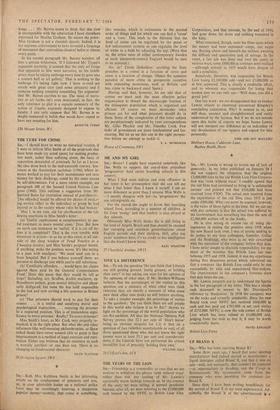SIR —Both Miss Kathleen Smith in her interesting article on the
employment of prisoners and you, sir, in your admirable leader on a national police force may be unwittingly fostering a dangerous popular heresy—namely, that crime is something,
like measles, which is extraneous to the normal order of things and for which one can find a 'cause' and a 'cure.' This leads to the delusion that the level of crime can be regulated by the penal or law enforcement systems as one regulates the level of water in a bath by adjusting the tap. (Were that so, the crime rates of either contemporary Sweden or early nineteenth-century England would be seen to be minimal.) No, sir! Crime (definition: anything the State punishes as a crime) is a function of stress and stress is a function of change. (Hence the apparent paradox of more crime in prosperous countries with expanding economies, such as Britain, and less crime in backward rural Spain.) Having said that, however, let me add that of course we must seek the most effective police organkation to thwart the microscopic fraction of the delinquent population which is organised and efficient. Of course we must reconsider what prisons arc for and what prisoners should do in them. Some of the complexities of this latter subject are perspicaciously indicated by your correspondents Mr. Giles Playfair and Mr. Timothy Cook. Few tasks of government are more fundamental and fas- cinating. But let us see this one in the right perspec- tive before we attempt to tackle it.






































 Previous page
Previous page